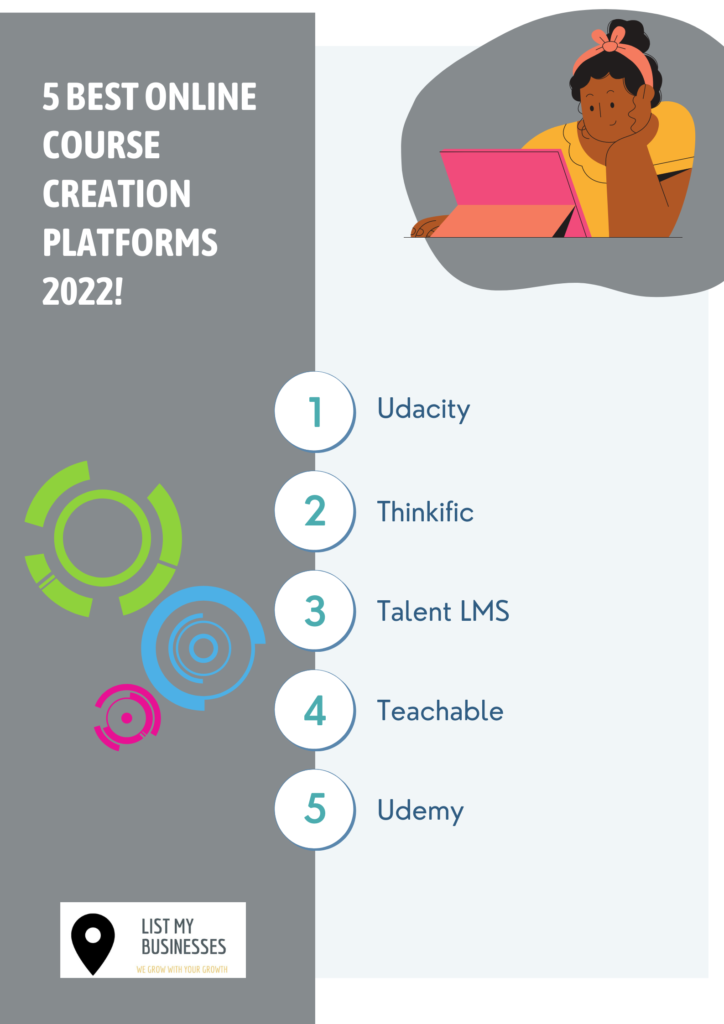The availability of different online course softwares and websites that allow users to take courses from any location at any time is increasing. Meanwhile, these top online course platforms enable anyone to develop courses and teach them to others. Traditional learning methods such as classrooms and workshops are being phased out in favour of e-learning and online training.

Did you know that, according to Research and Markets, the digital courses market is expected to rise to a total value of $325 billion by 2025? Did you know that? Surprised? However, with a plethora of excellent online course platforms to choose from, it might be tough to choose which is the most appropriate option for you. So, which are the best online course creation platforms? Let’s find out!
1. Udacity
It is one of the world’s largest providers of technology training as well as one of the best online course creation platforms, and it is headquartered in San Francisco. It offers some of the greatest courses for workers in the technology area who want to better their abilities.
What distinguishes it from the others?
Make your courses more interactive by including real-world projects that students may work on during their own time. Furthermore, the courses offered on this platform are designed to educate skills that IT professionals may put to use right away in their work. In addition, unlike many of the other platforms on this list, Udacity thoroughly evaluates teachers before allowing them to teach on their platform.
Characteristics
- Project-based learning is made possible.
- Mentors assigned to students to assist them in learning and completing courses.
- Provides nano-grades of materials
- The curriculum for each course is developed in conjunction with industry professionals.
Pros
- Corporations would be better suited to train their personnel in this manner.
- These courses significantly enhance the value of a professional’s résumé.
Cons
- It is mostly concerned with technical courses.
Also Checkout:Top 5 Google Digital Marketing Courses with Certification!
2. Thinkific
Imagine a platform with more than 40,000 course authors who have collectively earned more than $200 million in revenue from the sale of their courses on Thinkific. Since its inception, this platform has attracted more than 16 million students from more than 164 countries to enrol in online courses.
It is possible to create a whole curriculum using the platform’s drag-and-drop generator, which is not only useful for uploading pre-built courses but also for creating the entire curriculum. This tool may be used to create quizzes, add videos, and organise your course content in a way that is both interesting and simple to grasp.
Characteristics
- Course creation by dragging and dropping
- Easily create your own website to sell courses by using all types of multimedia content.
- It comes with a variety of themes and website templates that you can use right away.
- In order to market and sell online courses, it comes with a comprehensive collection of business tools.
Advantages
- A secure platform
- Allows people to create courses rather than merely sell them.
- Reach throughout the globe
- Interface that is user-friendly
- Users have the ability to create and sell an unlimited number of courses.
Cons
- It may take some time for new users to understand how to construct their first course.
3. Talent LMS
Actually, this platform differs from the other platforms featured here in that it is not a marketplace, but rather a software solution targeted for corporate use.
What exactly does this mean?
Therefore, it is not a platform for the creation and sale of courses. Instead, it is a platform that a company can utilise to provide online courses to its employees, customers, and other interested parties.
Characteristics
- Designing courses and evaluations is simple with this user-friendly interface.
- Survey results are collected and analysed using a survey engine built into the software package.
- Allows you to create a learning path by only allowing you to access certain courses after you have completed the fundamentals.
- Make learning more dynamic by including gamification features.
- Provides certifications to students who successfully finish courses.
- It allows for video conferencing to take place.
- In addition, it enables you to sell your courses through PayPal or Stripe.
- The software integrates with more than 200 platforms and applications.
Pros
- A fantastic tool for training your personnel in a fun and engaging manner.
- Courses that are simple to build and start
- Use of your own domain name and logo is permitted under this arrangement.
- Provides a free plan with only the most basic features.
Cons
- Individual teachers who want to sell courses on an e-commerce type platform will find this platform unsuitable.
Also Read:How to Start an Educational Business in India?
4. Teachable
This is a platform that lets anyone, not just those with extensive qualifications, to produce and sell a course.
What impact does this have on you?
You can still use the platform even if you don’t have a college degree or a lot of professional expertise. If you are good at anything, you can pass on your knowledge to others as well.
Over 83 thousand instructors and more than 23 million students use the site, which was launched in 2012. As of April 2020, there are more than 257k courses that are currently active on the platform. However, it is not all. Teachable provides a plethora of additional features. So let’s have a look at some of its most important characteristics.
Characteristics
- It is capable of supporting various forms of multimedia content.
- It enables users to import files straight from Google Drive, Dropbox, and other cloud storage services.
- Course Design with Drag and Drop Website Design and Development
- Page and course editor with a lot of features.
- Option to obtain a free domain name or to connect your existing domain name
- It can be used in conjunction with other technologies such as Olark and Zendesk.
- Marketing techniques that work in conjunction with one another
Pros
- It is less expensive than some of the other comparable platforms.
- It can be utilised by anyone who wishes to share their knowledge.
- There are no restrictions on the number of students or courses for any plan.
Cons
- Charge a transaction fee of 5 percent for the fundamental course.
5. Udemy
When Udemy first debuted, the company invested much in a comprehensive digital marketing strategy. Everyone has seen their excellent social media advertisements at some point.
Every time you sell your course(s) to a student, you can make money. Students pay you on a monthly basis through two major platforms: PayPal and Payoneer. As a creator, you can earn money on every sale. By becoming an Udemy creator, you may assist individuals in learning new skills that will help them succeed in their careers or improve their hobbies.
Are you ready to begin?
To get started with Udemy, all you need to do is register, plan your course, register your course, and begin creating your community of learners.
What can Udemy do to assist you?
They offer a fantastic teacher creation team that is ready around the clock to assist you with the construction of your courses. If you need assistance, there is an excellent Teacher Centre available that is chock full of tools to guide you through the process. If you’re looking for assistance from other instructors, you can find it in your local community through peer-to-peer support. Visit their website for additional details on the creator pay structure, as well as how to sell your courses on Udemy.
